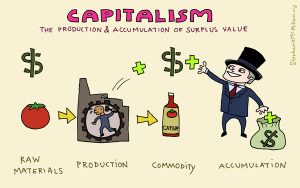 Capitalism is a mode of production – a totality of social relations that shapes how the society as a whole reproduces itself, how we all meet our needs, how we get from one day to the next. There are different modes of production, distinguished from one another by what drives the economy. This economic foundation generates, and is in turn supported by, a corresponding political system (which keeps one class in power over everyone else), plus prevailing ways of thinking that make it all seem natural and inevitable (such as the idea that “poverty we shall always have with us.”)
Capitalism is a mode of production – a totality of social relations that shapes how the society as a whole reproduces itself, how we all meet our needs, how we get from one day to the next. There are different modes of production, distinguished from one another by what drives the economy. This economic foundation generates, and is in turn supported by, a corresponding political system (which keeps one class in power over everyone else), plus prevailing ways of thinking that make it all seem natural and inevitable (such as the idea that “poverty we shall always have with us.”)
Other contemporary and recent modes of production besides capitalism are slavery and feudalism. All of these have one thing in common: class divisions that facilitate the accumulation of wealth by a small parasitical minority on the backs of the producing majority.
For slavery and feudalism, the new wealth taken possession of by the ruling class is the product itself. Under feudalism, a landlord takes half or a third of a peasant’s grain, whatever the quantity is and however much work the peasant put into it. But capitalist accumulation runs on a different formula. For capitalists, the product itself is not the point—the wealth they accumulate is the labor power extracted from workers in the production process. Labor power is wealth crystalized in commodities, in the form of surplus value (a form of profit). The particular kinds of commodities we produce don’t really matter; the money is made in the production of them.
In order not to starve, workers, who possesses or control no means of production, must sell our labor power, or ability to work, to the capitalist, for wages. (Our predicament is no accident, but has been engineered through systematic historical dispossession of formerly self-sufficient, land-based people.)
The big scam of capitalism is that wages are supposedly a fair trade of money for the amount of time that we work. Wages are generally based on what capitalists decide that we need for our survival—to pay our rent and feed our families. But in reality, capitalists are not buying our time—they are buying our labor power, which they use to produce commodities for them, that they later sell at a price higher than what they paid us. This profit is reinvested as new capital, which causes businesses (and the economy as a whole) to constantly grow larger.
During the work day, workers produce more value than the amount of wages we receive. Let’s say that during the first hour we manufacture cars or shirts or whatever that are equivalent to the value of our whole day’s wages. That means for the rest of the day, 7 hours or more, we work for free, creating new value for the economy. This new value (called “surplus value”) is not paid for. In other words, our labor power is being stolen; we’re being exploited. The wage system, because it appears to trade money for time (rather than labor power), makes exploitation seem fair and rational on the surface.
Even though they don’t produce anything, capitalists own, control, and manage the entire process of production and distribution for the whole society. Their ownership of the means of production—the raw materials, factory and machinery (which they obtained through previous cycles of exploitation or outright raw dispossession through war or other means), is used to justify depriving workers of any legal right to keep the product. So the capitalist takes everything that we produce, and we are conditioned to accept that. The notion of “private property” underlying this theft is the ideological foundation of capitalism, and is backed up and enforced by the political and juridical system. Capitalism elevates the pursuit of private profit as a fundamental right, even over the collective social good.
Surplus value isn’t simply a quantitative sum. It is an economic process embedded in a total social arrangement—a class relation. The entire society is set up to facilitate its extraction. All forms of capital accumulation (industrial, commercial, rentier, financial) depend on it.
This arrangement benefits only capitalists, never workers. Most workers receive barely enough to survive, deemed the “minimum wage.” Capitalists try to bribe some of us with slightly more, to create an unequal situation of “relative privilege” in the hopes of dividing us and keeping us pacified.
The amounts of profit and wages are constantly contested, capitalist against worker, class against class. They constantly fight to increase the rate of exploitation, to make us more “productive” – by either lengthening our work day or pushing down our pay. We constantly fight against exploitation, to slow down or work fewer hours, and increase our pay and benefits, to keep more of the wealth that we produce.
That’s class struggle, inherently antagonistic. What they win, we lose. What we win, they lose. The winner is determined by collective strength: which class as a whole can assert more power against and over the other. If we unite in our workplace, then we can fight to ease the rate of our particular exploitation. If we unite across workplaces, trades, and borders to topple capitalist rule over society, then we can end exploitation altogether.
